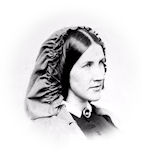 Abby Howland Woolsey to Joe.
Abby Howland Woolsey to Joe.
April 30.
. . . We had a very pleasant visit the other night from Charles Johnson, of Norwich, just returned from Port Royal. He went down as Allotment Commissioner from Connecticut and had pretty good success. He was particularly indignant about the chaplain of the Connecticut __th who had made a “handsome thing” all along out of the men whose money he received for being forwarded to their homes. He charged them a commission, and then by buying drafts on New York, which are at a premium in Bridgeport, Conn., managed to make his one per cent net. Charles J. arrived out the day of the bombardment of Fort Pulaski and was among the first visitors after its surrender. It was curious, he said, to see the extra defenses prepared by the rebels; heavy timber blindages against the casemates and quarters, all round the fort inside, sodded six feet deep with earth dug from trenches with which the whole parade was crisscrossed. These ditches were already two feet deep with the green, slimy water which had oozed upward through the soil. . . . He said that the 7th Connecticut, now garrisoning the fort, were a pale, peaked, sick-looking set, but every man of them as proud as Lucifer, and he came home with a higher idea than ever of the energy and spirit of our troops. One night he and Colonel Terry and Dr. Bacon couldn’t sleep on account of the mosquitoes and heat, and they agreed to bring out the letters left behind by the rebel prisoners, which had to be examined and sent some day to Savannah by flag of truce. There were more than a hundred; some very laughable specimens of course, but some well written and sensible. About thirty were written in one hand, by some officer for his different privates I suppose, and every one of them began, “We have met the enemy and we are theirs!” always winding up with the earnest advice to their friends, to quit Savannah. . . . Mr. Prentiss has lately spent a week in Washington, in company with Dr. Stearns and Professor Schaff. Everywhere they went, of every great man, Professor Schaff asked his stock question—whether the social and political conquest of the South was not to be more difficult than its military conquest. He received very characteristic answers. President Lincoln thought “perhaps, yes—but it wouldn’t cost so much money! “ Mr. Seward said, decidedly, “No” and then trotted himself out, most obligingly, in a dainty little sort of oration, using one of his fine figures in illustration. “You are like President King,” he said, “who was greatly concerned here, last week, about the dome of the Capitol, how it was ever to be finished, and whether it would bear the weight of the figure of Liberty that is to be placed on it, and how the figure was to be got up there, etc. I don’t know how it is to be done, but the engineers know. The plans were all made to accomplish just that result. The dome was built for the figure, and this figure cast to be in harmony and size with it, and the pulleys and ropes are all agreed upon; and though it is a long way from the ground, where the statue lies now, to the top of the finished dome, I know that the work will be done, and the figure of Liberty shall yet stand on the top of the Capitol.” . . . Mr. Chase was not so eloquent or philosophic. He thought we ought to “do our present duty and leave the future to Providence,” which perhaps was the best answer of all; and putting the three together Professor Schaff was well satisfied with the argument and quite willing to be laughed at by his friends for his pertinacity in asking the question.









